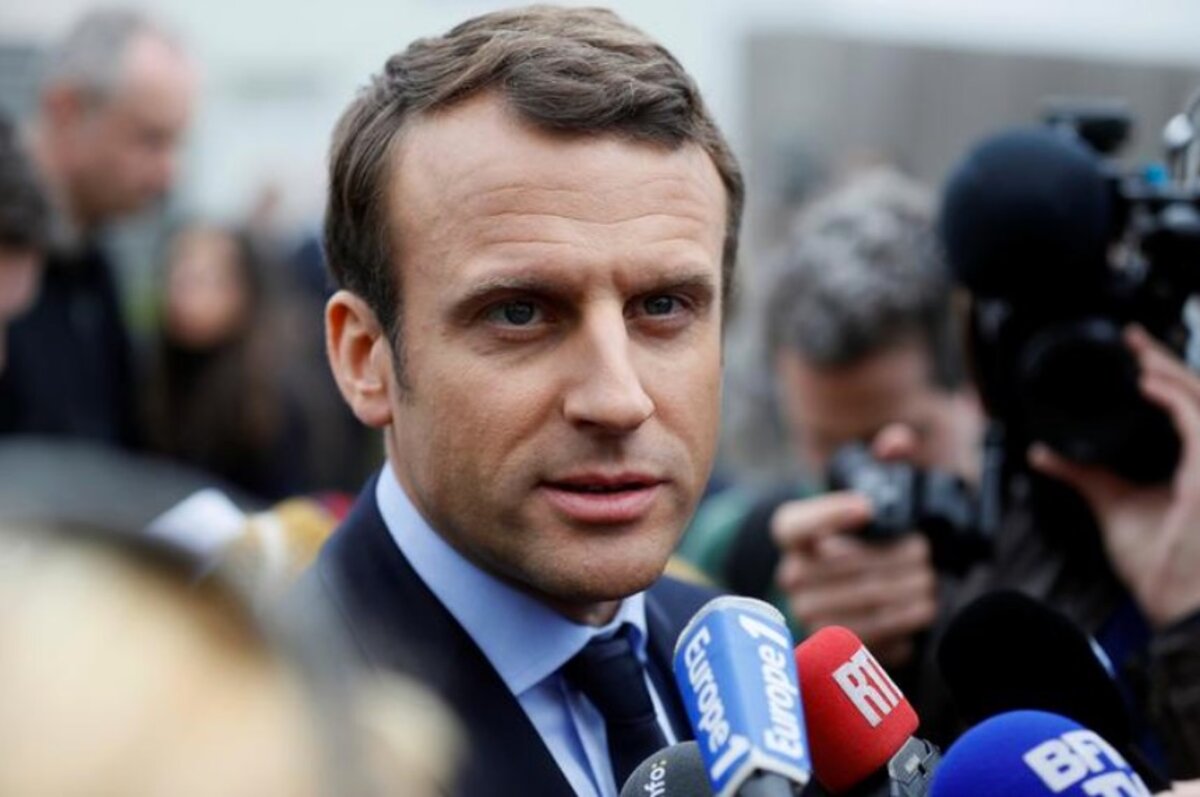Let us cast our minds back nine months to get a better sense of what happened yesterday, April 23rd. Back then the script seemed to have already been written, featuring the following cast: President François Hollande, former president Nicolas Sarkozy, the far right's Marine Le Pen and radical left politician Jean-Luc Mélenchon. “2012 – the rematch” was the title of this film that all, or just about all, of them wanted. Hollande had let it been known for months that his preferred candidate in the 2017 presidential election would be Nicolas Sarkozy whom he had beaten in 2012. Sarkozy, meanwhile wanted to crush, to use his elegant phrase, that “complete dead loss” in the Elysée. The Le Pen family business could hardly do other than put up one of its representatives. And as for Mélenchon, who had already set off as a lone candidate some time before, he was able to exploit the weaknesses and divisions of the radical left.

Enlargement : Illustration 1

Nothing went as planned. And April 23rd will go down as the day a political system set up fifty-five years in 1962 ago under Charles de Gaulle with the dire decision to build French democracy around the presidential election, finally exploded. The disintegration of this system, decided upon by voters in an election that saw a good turnout (around 80%) on Sunday is excellent news. It was also a logical choice in line with the wishes the electorate had already expressed, in particular in the presidential primaries held by the Right and the Left in which first Sarkozy then former socialist prime minister Manuel Valls – who stood when Hollande chose not to - were unceremoniously rejected.
Everything begins now in what has, since Sunday, been heralded as a large-scale recomposition of political forces in France. For the first time in the Fifth Republic the candidates of the two man political groupings that have formed the political landscape and which have been destined to govern – the Socialist Party and the Republican Right – have been eliminated.
It is an historic disaster for the Socialist Party which is close to the score achieved by the moribund French Section of the Workers' International (SFIO) in 1969 (its candidate Gaston Deferre received 5% of the vote). In 1971 the Épinay Congress gave birth to the Socialist Party which came to power ten years later. “It's an historic and justified punishment for the Socialist Party,” its candidate Benoît Hamon, who received around 6.5% of the vote, said on Sunday evening. “It's an electoral and moral defeat.”
It is an astonishing disaster for the Right, for whom victory seemed assured as recently as January. The stubborn blindness of its candidate François Fillon (who got around 19% to 20% of the vote), who was too preoccupied with denouncing media and judicial plots, has dragged the Right into spectacular self-destruction. However, it was also the case that the main leaders on the Right were unable to stop Fillon's suicide mission. “It wasn't just one mistake that was made, there are some fundamental questions. I didn't think that Gaullism could be eliminated, it's an earthquake,” accepted François Baroin, a former minister who had campaigned closely with Fillon.
The brutal sanctioning of the two main parties of government signals the end of a political cycle, accompanied by several encouraging signs for the months to come. The first is the relative stagnation of the far-right Front National vote. With around 21% of the votes cast, its president Marine Le Pen has been unable to broaden her electorate. Quite the contrary, she has continued to go backwards throughout the campaign when the polling firms had, for months, placed her very significantly in front. Just a few months ago some polls were giving her a potential vote of 30%.
This curbing of the Front National vote marks the failure of her strategy and her direction which sought to portray her as the great alternative to the “system in place”. And it is very likely that this mediocre score will open up serious discussions, even a crisis inside the far-right party. For since Sunday evening all of the Left, as well as the Republican Right, have been clearly calling on the electorate to vote for Emmanuel Macron to defeat Marine Le Pen. Only Jean-Luc Mélenchon declined to make this call, leaving the decision to members of his movement, Unbowed France. “Frankly, everyone knows their duty,” he declared.
The two men who are the real victors in this vote and who find themselves bringing about a profound change in French politics are thus Emmanuel Macron and Jean-Luc Mélenchon. Even if he did not qualify for the second round, the leader of Unbowed France has seen the validation of a political strategy built and developed over many years, with a score of around 19%. In the presidential election of 2012, Mélenchon had been unable to make such progress. In particular his vote then of just over 11% had not been enough to influence the balance of power on the Left. This was shown just a month later in June 2012 when the Front de Gauche ('Left Front') was unable to rid itself of its constituent parties and obtain Members of Parliament.
Emmanuel Macron, who had been President Hollande's economy minister until August 30th, 2016, and before that his advisor and then deputy chief of staff, is thus the person who has exploded the system. It is no small paradox that this man, who was one of the key players in Hollande's presidency, has become the pivot around which political life will be reorganised.
A new Épinay Congress for the Socialist Party?
The 'Republican front' against Le Pen, announced by all political leaders on Sunday with the exception of Mélenchon, should thus carry this man to the Elysée. This 39-year-old, who would be the youngest president under the Fifth Republic, has come from nowhere, with no party, and claiming to be from the centre (in fact he is on the centre right). Emmanuel Macron has broken all the taboos and thrown aside all the rules which had until now prevailed for all those who sought the presidency: the need for lengthy political careers; the support of powerful parties; a clear position on the Left or Right. The centre ground has been at best a political auxiliary force, at worst a Bermuda Triangle. The centrist Jean Lecanuet failed in his bid for the presidency in 1965. The sudden emergence now of a centrist political force, and its likely victory, is by itself a signal of the end of the Fifth Republic.
Emmanuel Macron cannot be unaware of the fragility of this position: what political forces will there be to support him in the long run; and, above all, what Parliamentary majority will support him after June's Parliamentary elections? But this very fragility opens up new horizons. Especially when these new horizons coincide with an historic crisis in the Socialist Party and the emergence of a radical left that has been marginalised since the 1970s.
For it is indeed the Left that will mostly draw the contours of the new French political landscape. The leaders on the Right explained this clearly on Sunday evening. A victory for them in June's Parliamentary elections could stop them from ushering in a major change of direction and instead see them in political 'cohabitation' with the Macron presidency. “We've clearly lost, the scandals sank us, but we can win the Parliamentary elections, I remain convinced that our ideas are in the majority,” said conservative Laurent Wauquiez, Les Républicains president of the Auvergne-Rhône-Alpes region in central south-east France, on Sunday.

Enlargement : Illustration 2

So it is on the Left that the key changes will take place. How? That will be the key issue at stake in the coming weeks and months. But the paths are already being sketched out. The defeated socialist candidate Benoît Hamon, while accepting his own failure to “stop disaster” and taking “full responsibility” for his vote, quickly pointed out the “crazy self-destruction of the Left” and the “justified punishment of the Socialist Party”. The candidate also looked to the future, explaining that he had led a “pioneering campaign which gave back a place for young people, for intellectuals … so many seeds have been sown”. One of his main supporters Aurélie Filippetti, a former culture minister, said: “You don't expect a reforming of the political machinery in the context of a Fifth Republic that is on its last legs.” She has explicitly called for a “new Épinay”, something that has incidentally also been envisaged by Gérard Collomb, the socialist mayor of Lyon who is a supporter of Macron.
Hamon's chief opponent inside the Socialist Party (PS), junior minister Jean-Marie Le Guen - who says he voted for Macron in the first round – proposed taking the opposite direction on Sunday. The PS will construct a presidential majority with Emmanuel Macron, he said, while maintaining its own manifesto in June's Parliamentary elections. The strategy of this close ally of Manuel Valls is clear: to take over the PS party machinery as quickly as possible, oust Benoît Hamon and build a coalition with the likely centrist president Macron.
The key to this recomposition is in fact in Jean-Luc Mélenchon's hands. With more than 19% of the vote – against around 6.5% for Hamon – the leader of Unbowed France is in a position to assert his own plans to rebuild the Left. What will he do and say about a scenario that was already envisaged before the first round by those close to Hamon and the Greens, namely to create a new party or movement, accepting that the Socialist Party is clapped out? Up until now Jean-Luc Mélenchon and those close to him have been wary about talking of the future, other than guaranteeing that Unbowed France will have candidates in the 577 Parliamentary constituencies.
So after the events of April 23rd, a new era is dawning. The main danger, that of Marine Le Pen being elected, has receded and that should be applauded. The prospect of a centrist presidency, without a guaranteed Parliamentary majority, leaves the field open for the rebuilding that is required. Just like the punishment inflicted on a Socialist Party that for years has forgotten its electorate and its manifestos and which has become engulfed by individual ambitions. Everything now has to be recast. At last!
-------------------------------------------------------------------------------
- The French version of this report can be found here.
English version by Michael Streeter


